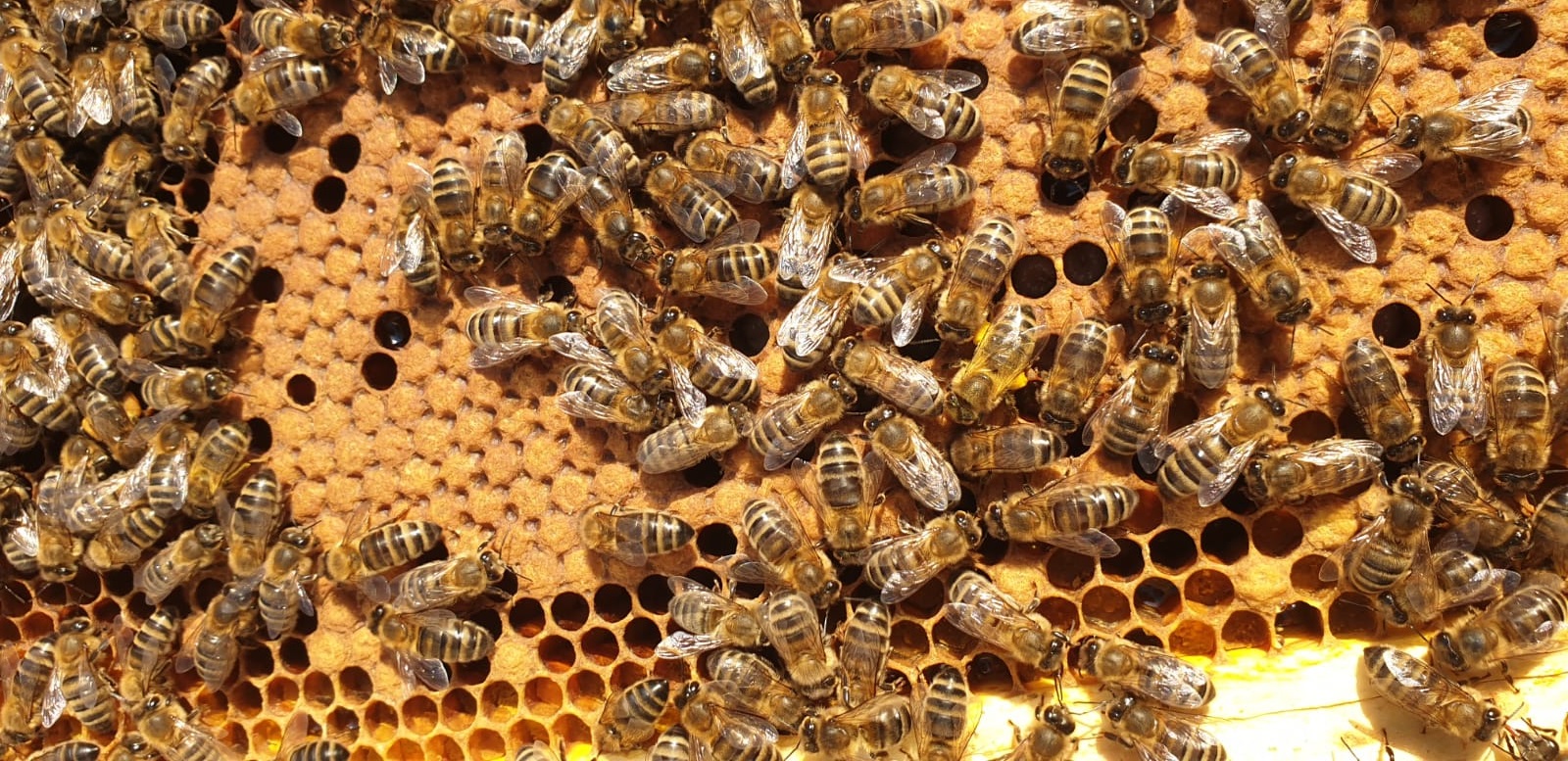 Abraham Lincoln
If given the truth, the people can be depended upon to meet any national crisis...
Abraham Lincoln
If given the truth, the people can be depended upon to meet any national crisis...
 Guildford news...
for Guildford people, brought to you by Guildford reporters - Guildford's own news service
Guildford news...
for Guildford people, brought to you by Guildford reporters - Guildford's own news service
Beekeeper’s Notes: A Surprise In The Hive
Published on: 1 Apr, 2021
Updated on: 31 Mar, 2021
Hugh Coakley keeps bees in Worplesdon
The beekeeper’s season has well and truly started. The first hive inspections of the year are a bit nerve wracking. You don’t quite know what to expect and whatever you find is going to define the rest of your beekeeping year.
How well did the hives survive the winter? Are the queens laying as they should? Any disease?
What I didn’t expect was to find a new queen in one of the hives just after the winter.
Last September, all of my queens were marked with a coloured spot on the thorax, just behind her head. Marking the queen makes it so much easier to spot her. Where’s Wally comes to mind when looking for the queen in a packed hive.
But in one hive, there was a surprise; an unmarked queen happily laying eggs. The bees sometimes just decide to get rid of a queen and replace her. She may be underperforming or injured. There are few if any drones about now to mate with, so she must have been superceded before the winter set in.
It is a risky strategy as drones are few and far between late in the year. But it worked and that hive now has a lovely new queen to start the year.
On a less happy note, the question of whether managed honey bees out-compete other pollinators continues (see also Beekeeper’s Notes: Too much urban beekeeping may be bad).
There is evidence in Scotland that worker bumblebees were significantly smaller when foraging alongside honey bees. A study in Sweden showed that other pollinators in a rich forage area were displaced when honey bees were introduced.
Is the answer then to reduce the number of honey bees to help wild pollinators? Possibly in some situations but in general, I suspect not.
Managed honey bee colonies are said to be in decline. As are insects in general with horrifying estimates of up to 2.5% reduction in insects numbers each year. But fewer insects should mean they get a bigger share of the forage. The studies above would indicate that is not the case.
Is the answer then more likely to be habitat loss and therefore less food available for the insects? There should be plenty for all but it would appear not so.
Whatever the answer, it has made beekeepers think about what they are doing to the natural world. Beekeeping, once thought of as unquestionably a good thing, is now called into question.
Responses to Beekeeper’s Notes: A Surprise In The Hive
Leave a Comment Cancel reply
Please see our comments policy. All comments are moderated and may take time to appear. Full names, or at least initial and surname, must be given.
Click on cartoon for Dragon story: Public Asked for Views on SCC’s Proposal for Reduced Speed Limits


Recent Articles
- Witness Appeal Following Serious Assault in Guildford
- Notice: Can You Help the University of Surrey Research Elderly Falls?
- Opinion: Waverley Has Failed Spectacularly on CIL
- Highways Bulletin: Smarter Planning for Better Bus Journeys in Surrey
- Letter: Will GBC’s New Planning Document on Building Heights Be Effective?
- Proposed New Leisure Contract Should Improve Facilities and the Council’s Income
- Witness Appeal Following Fatal Collision
- Celebration at Guildford Cathedral of Its Latest and Future Church Leaders
- Photo Feature: Now You See It…
- Letter: Snail-paced Progress for Full Weir Repair


Recent Comments
- Jan Messinger on Public Asked for Views on SCC’s Proposal for Reduced Speed Limits
- Fiona White on GBC Asks Residents for Views on Its Draft Building Height Guidance
- Dave Middleton on Letter: Fine Those Guilty of Anti Social Behaviour
- Carina Coverly on GBC Asks Residents for Views on Its Draft Building Height Guidance
- M Durant on Online Event Will ‘Help Residents Have Their Say On Local Government Reorganisation’
- Jim Allen on GBC Working Hard To Mitigate Looming Weyside Urban Village Deficit
Search in Site
Media Gallery
Dragon Interview: Local Artist Leaves Her Mark At One of England’s Most Historic Buildings
January 21, 2023 / No Comment / Read MoreDragon Interview: Lib Dem Planning Chair: ‘Current Policy Doesn’t Work for Local People’
January 19, 2023 / No Comment / Read MoreA3 Tunnel in Guildford ‘Necessary’ for New Homes, Says Guildford’s MP
January 10, 2023 / No Comment / Read More‘Madness’ for London Road Scheme to Go Ahead Against ‘Huge Opposition’, Says SCC Leader
January 6, 2023 / No Comment / Read MoreCouncillor’s Son Starts Campaign for More Consultation on North Street Plan
December 30, 2022 / No Comment / Read MoreCounty Council Climbs Down Over London Road Works – Further ‘Engagement’ Period Announced
December 14, 2022 / No Comment / Read MoreDragon Interview: GBC Reaction to the Government’s Expected Decision to Relax Housing Targets
December 7, 2022 / No Comment / Read MoreHow Can Our Town Centre Businesses Recover? Watch the Shop Front Debate
May 18, 2020 / No Comment / Read More







Harry Eve
April 1, 2021 at 2:14 pm
I think I know how the colony made their decision. The previous queen refused to recognise the constraints of the hive so her workers held an election and elected a responsible replacement.